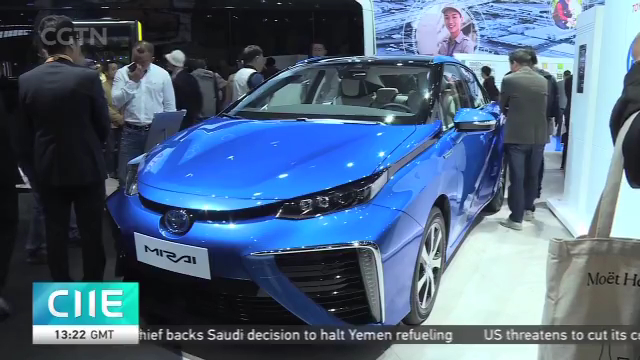
22:35, 10-Nov-2018
China International Import Expo: Is hydrogen or batteries the future of autonomous EVs?
Updated
21:46, 13-Nov-2018
03:15

By one estimate, there are over 2.4 million electric vehicles sold in China to date. One of out every 2 EVs sold, worldwide, rolls off a showroom somewhere in China. But how is this rapid growth in EV sales compelling car manufacturers to change how they build and sell vehicles? CGTN's Ramah Nyang sought some answers at the CIIE.
Hyundai, Volvo, Toyota, Porsche. 4 very different car companies, but they all agree that the future of transport will be both electric and autonomous. What they don't agree on, is the power source. Will it be increasingly better batteries, or something else?
RAMAH NYANG SHANGHAI "The answer, if you're Hyundai, is this - hydrogen fuel cells. The only thing you're getting out of the back as far as emissions are concerned is water. Other manufacturers however are taking a different perspective."
Toyota may no longer be the biggest vehicle manufacturer in the world, but it's hedging its bets by pursuing hybrids, hydrogen powered vehicles like the Mirai, and now, automated EVs. The ePallet concept will be deployed at the Tokyo Olympics in 2020. Given fuel infrastructure constraints, batteries will power these.
XU YIMING HEAD OF PR, MARKETING DEPARTMENT, TOYOTA "It's a self-driving EV with lithium batteries. We call hydrogen fuel the ultimate green energy source but hydrogen fuel cell vehicles are now facing one of the biggest issues: the hydrogen filling station, which is an infrastructure issue. Compared to the construction of a hydrogen station, the infrastructure of charging ports are more mature at present."
As manufacturers chase increasingly stringent emissions targets, the choices consumers are making are flowing down the supply chain. Whereas in the past, firms had to make most of their components in house, now, they can order a suite of cameras, RADAR and LIDAR sensors, steering and brake controls, and a computer to run everything, off the shelf.
GAO YANG, APPLICATION ENGINEER DRIVER ASSISTANCE SYSTEM, ZF "Exactly, as ZF we are a systems supplier. We do not only provide the product, but also we provide the whole self driving automotive system."
This is a hidden, but increasingly diverse market, attracting firms like Aisin, and even Nvidia - the processor maker. Even the infrastructure side is changing. In June, BP, one of the world's largest oil firms, bought Chargemaster, the UK's biggest vehicle charging company, getting the country's biggest charging network for about $ 170 M.
RAMAH NYANG SHANGHAI "All of which brings us very neatly to the top end of the market, what fuel will drive the future? Well, if you're Porsche, even they agree that the future will be electric. Take, for example, the Mission-E, their mission statement on what they think the future of performance will be. Low slung, four seater, all wheel drive, and it should be fun to drive. We don't have access to this yet - that's just a concept - but if they're going to bring that to market, I can't wait to drive it.
For that and more on the future of transportation in Shanghai, at the CIIE, I'm Ramah Nyang."

SITEMAP
Copyright © 2018 CGTN. Beijing ICP prepared NO.16065310-3
Copyright © 2018 CGTN. Beijing ICP prepared NO.16065310-3